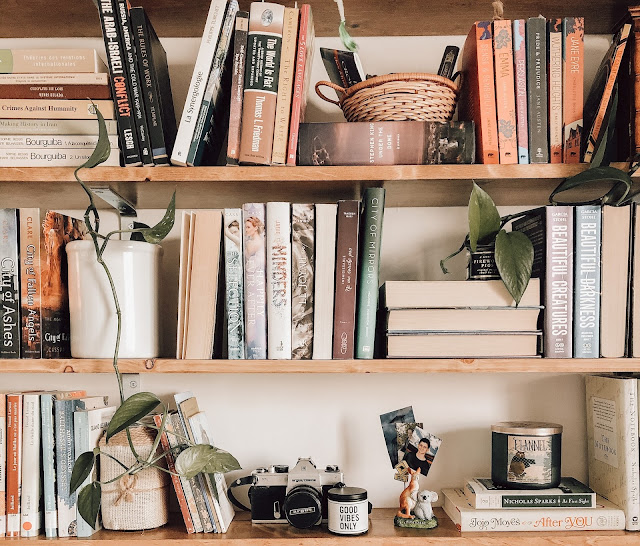10 Surprisingly Easy Ways to Declutter Books
Don't get me wrong – I love books. I've been an avid reader since I was six years old, and it's a habit I never want to lose.
I enjoy beautiful physical books, but a large and growing library is physically cumbersome. It's heavy, space-hogging, and expensive to boot.
When you're ready to think about decluttering books, these suggestions will help.
How to prune your home library successfully
1. Count your books.
Decide to give a certain percentage away (start with 10% if you're unsure).
2. Give away a bookshelf.
Choose your favorites to fit on the shelves that remain.
3. Curate your ultimate classics.
An ultimate classic is the iconic representation of its class – the best, most useful, most valued, just-right item.
- your favorite pair of jeans
- the most comfortable, good-looking chair
- the perfect ceramic skillet* you reach for again and again.
* This blog is reader-supported. If you buy through my links, I may earn a small commission.
You probably have favorite books you read over and over. These are the books you want to have beautiful hardcover copies of, or that you buy cheap, used paperback copies of so you can loan them out to all your friends. They're the books you want on your proverbial desert isle.
Forget the also-rans and stick with your ultimate classics.
4. Reduce the TBR pile.
Those of us who love to read always have a pile of things we plan to read "someday soon." Reduce or even eliminate your pile. After all, there's a reason they're still just sitting there.
5. Check out the library.
Libraries have been around for millennia, but for most of that time they were only available to scholars and the very rich. By the 1600s there were a few libraries open to the public, but most required a reservation and a pass, and the books were chained to the shelves or desks. In the 1700s, lending libraries were more common, but most required subscription fees, which not everyone could afford.
The first free library, open to all, didn't exist until 1833. Today, you probably have easy access to a public library (mine is less than 2 miles away). Yet many people seldom or never visit their public library.
Decide not to be one of those people. Visit your library regularly, and enjoy what it has to offer. When you make a habit of borrowing books, you don't need to own so many.
6. Investigate Kindle.
I've always been one to bring a book along when I travel or when I think I might have to wait somewhere (such as a doctor's office). Once I downloaded Amazon's free Kindle app, I was able to keep e-books on my phone, making them much more portable.
For the most memory, portability, and distraction-free reading, consider a Kindle. Without ads and with three free months of Kindle Unlimited (a subscription service allowing you to borrow rather than buy e-books), the cost is less than $120.
By the way, all of my books are available in Kindle editions and on Kindle Unlimited!
7. Create a reading nook.
Have you always dreamed of dedicating a room in your home to your books? Instead of an entire home library, create a reading nook instead. Make it tiny, cozy, and filled with only the best. Try a comfy chair, one small bookcase, a small table and a lamp. Bliss.
8. Lose your ego.
Books often represent our learning, culture, and savvy – at least to ourselves. After all, how can you show how smart and sophisticated you are without your books? Well, how about with your conversation? If you've actually read the books, you'll have plenty to discuss.
9. Give up fear.
Fear is a major barrier to decluttering anything. What if I want or need this again someday? What if I get bored or there's another pandemic? Learn to trust your resourcefulness.
10. Write your own.
We're used to relying on others to supply us with entertainment and enlightenment, yet for millennia humans created their own stories, music, dance, etc. While it can be fun to think about your "desert island" book collection, that would by definition be extremely small. What happens after you've read those few precious works?
A wonderful 1980s children's sci-fi book by Jill Paton Walsh, The Green Book, answers that question (among others). Pattie, age eight, writes her own. Culture exists because of people who create. Why not be one of them?
Related article: How to Pare Down Your Home Library and Uncover the Books You Love






I am lucky enough to have a wonderful library right around the corner. I get all the books I read -- physical and electronic -- from my library, for free. My TBR "pile" is a list on the library website, and the borrowing period (3 weeks) forces me to not take on more than I can actually read. I think libraries are the most undervalued, underutilized, amazing resource in our communities.
ReplyDeleteYou're so right!
Delete